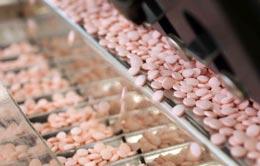Canada halts imports of 16 drugs made in India

Canada has stopped the importation of several drugs and drug ingredients from two Indian factories, as concern mounts in North America over health products source from the multi-billion dollar South Asian pharmaceutical industry.
Among the products on the Canada blacklist are medicines like blood-pressure pills to chemotherapy drugs, anti-psychotics and painkillers.
Canada’s action comes after a U.S. Trade Representative special investigation noted: "Reports indicate that anywhere from 10-40 percent of drugs sold in Indian markets are counterfeit and could represent a serious threat to patient health and safety."
India produces nearly 40% of the generic drugs used in the US and Canada and has been stepping up production in anticipation of increased demand.
At Health Canada's request, Canadian importers have agreed to quarantine health products from the following two India-based sites due to data integrity concerns:
Dr. Reddy's Laboratories in Srikakulam, India
IPCA Laboratories in Pithampur, India
It said the action comes in light of recent information from a trusted regulatory partner that raises concerns about the reliability of the laboratory data generated at these sites.
A quarantine means that the Canadian importers have agreed to stop the importation and distribution of products from these two sites. At this time there is no identified risk to health, and Health Canada is not requesting a recall of any of the products.
Health Canada said it will continue to work with international partners and Canadian importers to gather and assess information regarding the situation and take action as necessary to help protect Canadians.
Amir Attaran, Canada research chair in law and population health at the University of Ottawa questioned why Health Canada has not blocked the sale of those medicines that had arrived on shelves earlier from the factories.
"How can the product be too dangerous to import, but safe enough to go down a Canadian's throat?" Attaran said in a interview with the National Post.
He said the integrity problems could range from relatively innocuous data-entry shortcomings to clearly fraudulent behaviour - such as fudging results on drug-stability tests.
Canada's increasing use of Indian-made medications, coupled with India's antiquated regulatory system, points to the need for more drastic action, such as barring all imports if the country fails to modernize its rules, Attaran said.
A newspaper in India reported that inspectors from the U.S. Food and Drug Administration had earlier found problems at the plants - Dr. Reddy's Laboratories in Srikakulam and IPCA Laboratories in Pithampur.
The Indian government has said it is investigating reports of generic versions of some medicines being manufactured without proper testing.
Health Minister J.P. Nadda. said that the government was aware of the reports regarding manufacturing of generic versions of some drugs without proper testing.
"The Indian Council of Medical Research has taken up the matter with the Drug Controller General of India (DCGI) for action against such erring companies," he said.
Earlier, as part of efforts to ensure that Indian pharmaceutical products meet international standards, New Delhi said it is spending about $500 million to build the capacity of the country's drug regulators.
National drug controller G.N. Singh said part of the money is to be used to set up a National Drug Regulatory Academy to train professionals who test drugs in the laboratories.
Singh said the government was also compiling a national pharmacopia to guide in the manufacture of drugs.
He said the government's zeal to bring about affordable quality drugs to the people could only materialise if the government's zero tolerance for poor quality drugs was monitored by implementing laws that punished those who violated the rules.
Sudhanshu Pandey, joint secretary in the ministry of commerce and industry, said Indian generic drugs have become globally accepted and respected, and for this reason, there was the need to send a loud message out that the government was ready to ensure that the manufacturers met the standards required of them.
Pandey said patents for about 160 drugs would be expiring soon and that would give manufacturers more opportunities but, at the same time, he cautioned that it meant that innovations in the industry will have to be transparent so that global regulators would not question the standards.
Pharmaceutical Export Council of India (Pharmexcil) says that eight out of the world's top 25 generic companies come from India.









